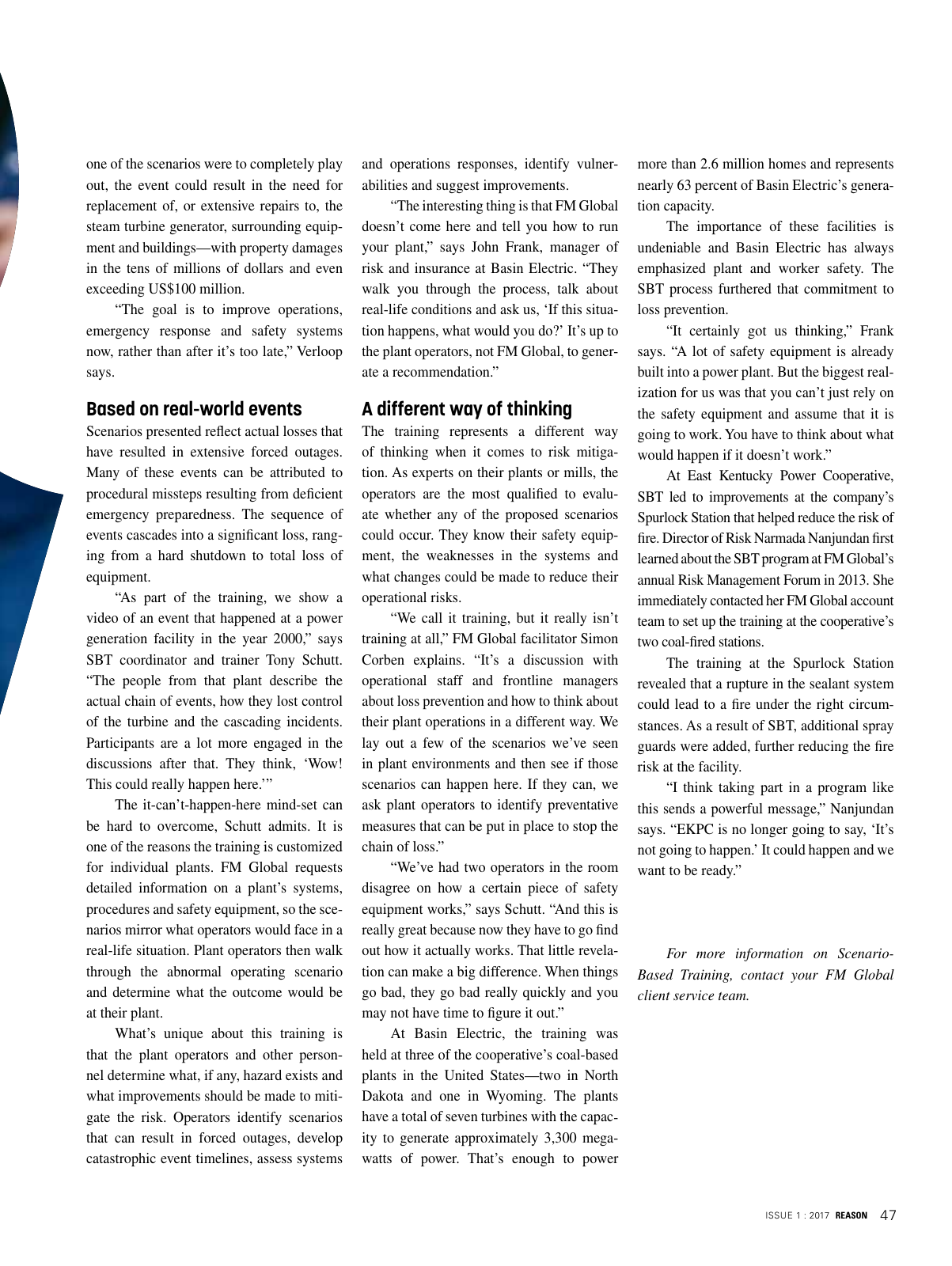ISSUE 1 2017 REASON 47 one of the scenarios were to completely play out the event could result in the need for replacement of or extensive repairs to the steam turbine generator surrounding equip ment and buildings with property damages in the tens of millions of dollars and even exceeding US 100 million The goal is to improve operations emergency response and safety systems now rather than after it s too late Verloop says Based on real world events Scenarios presented reflect actual losses that have resulted in extensive forced outages Many of these events can be attributed to procedural missteps resulting from deficient emergency preparedness The sequence of events cascades into a significant loss rang ing from a hard shutdown to total loss of equipment As part of the training we show a video of an event that happened at a power generation facility in the year 2000 says SBT coordinator and trainer Tony Schutt The people from that plant describe the actual chain of events how they lost control of the turbine and the cascading incidents Participants are a lot more engaged in the discussions after that They think Wow This could really happen here The it can t happen here mind set can be hard to overcome Schutt admits It is one of the reasons the training is customized for individual plants FM Global requests detailed information on a plant s systems procedures and safety equipment so the sce narios mirror what operators would face in a real life situation Plant operators then walk through the abnormal operating scenario and determine what the outcome would be at their plant What s unique about this training is that the plant operators and other person nel determine what if any hazard exists and what improvements should be made to miti gate the risk Operators identify scenarios that can result in forced outages develop catastrophic event timelines assess systems and operations responses identify vulner abilities and suggest improvements The interesting thing is that FM Global doesn t come here and tell you how to run your plant says John Frank manager of risk and insurance at Basin Electric They walk you through the process talk about real life conditions and ask us If this situa tion happens what would you do It s up to the plant operators not FM Global to gener ate a recommendation A different way of thinking The training represents a different way of thinking when it comes to risk mitiga tion As experts on their plants or mills the operators are the most qualified to evalu ate whether any of the proposed scenarios could occur They know their safety equip ment the weaknesses in the systems and what changes could be made to reduce their operational risks We call it training but it really isn t training at all FM Global facilitator Simon Corben explains It s a discussion with operational staff and frontline managers about loss prevention and how to think about their plant operations in a different way We lay out a few of the scenarios we ve seen in plant environments and then see if those scenarios can happen here If they can we ask plant operators to identify preventative measures that can be put in place to stop the chain of loss We ve had two operators in the room disagree on how a certain piece of safety equipment works says Schutt And this is really great because now they have to go find out how it actually works That little revela tion can make a big difference When things go bad they go bad really quickly and you may not have time to figure it out At Basin Electric the training was held at three of the cooperative s coal based plants in the United States two in North Dakota and one in Wyoming The plants have a total of seven turbines with the capac ity to generate approximately 3 300 mega watts of power That s enough to power more than 2 6 million homes and represents nearly 63 percent of Basin Electric s genera tion capacity The importance of these facilities is undeniable and Basin Electric has always emphasized plant and worker safety The SBT process furthered that commitment to loss prevention It certainly got us thinking Frank says A lot of safety equipment is already built into a power plant But the biggest real ization for us was that you can t just rely on the safety equipment and assume that it is going to work You have to think about what would happen if it doesn t work At East Kentucky Power Cooperative SBT led to improvements at the company s Spurlock Station that helped reduce the risk of fire Director of Risk Narmada Nanjundan first learned about the SBT program at FM Global s annual Risk Management Forum in 2013 She immediately contacted her FM Global account team to set up the training at the cooperative s two coal fired stations The training at the Spurlock Station revealed that a rupture in the sealant system could lead to a fire under the right circum stances As a result of SBT additional spray guards were added further reducing the fire risk at the facility I think taking part in a program like this sends a powerful message Nanjundan says EKPC is no longer going to say It s not going to happen It could happen and we want to be ready For more information on Scenario Based Training contact your FM Global client service team

Hinweis: Dies ist eine maschinenlesbare No-Flash Ansicht.
Klicken Sie hier um zur Online-Version zu gelangen.
Klicken Sie hier um zur Online-Version zu gelangen.